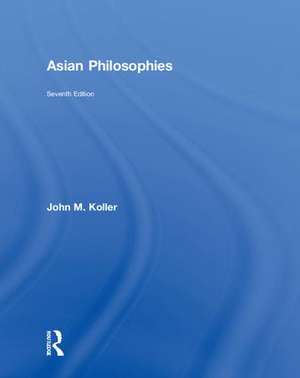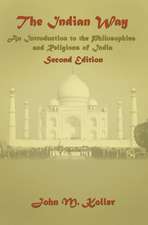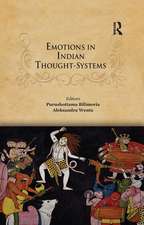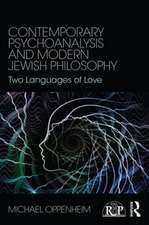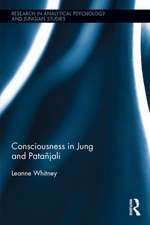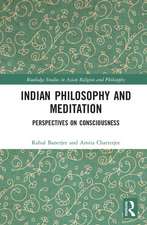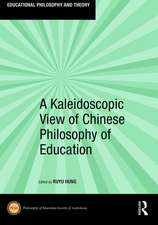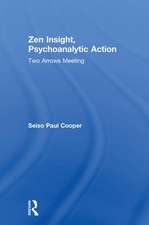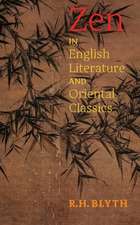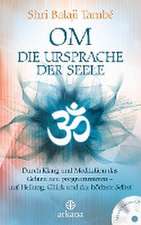Asian Philosophies
Autor John M. Kolleren Limba Engleză Hardback – 2 feb 2018
New to this seventh edition:
- Added material on Confucianism, including focused coverage of (1) the Analects and society and (2) ren and nature;
- Additional information on Theravada Buddhism, Vajrayana Buddhism, and Zen Buddhism as well as new in-depth coverage of ecological attitudes in Buddhism;
- Expanded coverage of ecological attitudes in all of the Asian traditions;
- Brief excerpts from primary sources to help better explain the key concepts;
- Added timelines for essential texts in each tradition;
- Improved Glossary and Pronunciation Guide;
- Additional text boxes, to help students quickly understand key ideas, texts, and concepts;
- Updated Further Reading sections.
| Toate formatele și edițiile | Preț | Express |
|---|---|---|
| Paperback (1) | 594.62 lei 3-5 săpt. | +30.17 lei 4-10 zile |
| Taylor & Francis – 7 feb 2018 | 594.62 lei 3-5 săpt. | +30.17 lei 4-10 zile |
| Hardback (2) | 875.55 lei 6-8 săpt. | |
| Taylor & Francis – 2 feb 2018 | 875.55 lei 6-8 săpt. | |
| Taylor & Francis – 11 iul 2017 | 1019.95 lei 6-8 săpt. |
Preț: 875.55 lei
Preț vechi: 1178.15 lei
-26% Nou
Puncte Express: 1313
Preț estimativ în valută:
167.56€ • 174.29$ • 138.33£
167.56€ • 174.29$ • 138.33£
Carte tipărită la comandă
Livrare economică 15-29 aprilie
Preluare comenzi: 021 569.72.76
Specificații
ISBN-13: 9781138629714
ISBN-10: 1138629715
Pagini: 428
Ilustrații: 22
Dimensiuni: 187 x 235 x 32 mm
Greutate: 0.45 kg
Ediția:7
Editura: Taylor & Francis
Colecția Routledge
Locul publicării:Oxford, United Kingdom
ISBN-10: 1138629715
Pagini: 428
Ilustrații: 22
Dimensiuni: 187 x 235 x 32 mm
Greutate: 0.45 kg
Ediția:7
Editura: Taylor & Francis
Colecția Routledge
Locul publicării:Oxford, United Kingdom
Public țintă
UndergraduateCuprins
CONTENTS
Glossary
Pronunciation Guide
Preface
Acknowledgements
Introduction
PART 1 South Asian Philosophies
South Asian Chronology
South Asian Texts: A Timeline
1. Historical Perspectives
Historical Overview
Dominant Features
Review Questions
Further Reading
2. Vedas and Upanishads
Indus Culture
Vedic Thought
Origins of Existence
The Upanishads
Quest for Brahman
Quest for the Ultimate Self (Atman)
Tat Tvam Asi
Review Questions
Further Reading
3. The Jain Vision
Overview
Mahavira
Karmic Bondage
Reality
Kinds of Karma
Way of Liberation
Knowledge
Faith
Conduct
Impact of Jain Thought
Review Questions
Further Reading
4. Buddhism: The Basic Teachings
Overview
The Buddha
Quest for Enlightenment
Enlightenment
The Buddha’s Teachings
The Noble Fourfold Truth
The First Noble Truth
The Second Noble Truth
The Third Noble Truth
The Fourth Noble Truth: The Eightfold Noble Path
Review Questions
Further Reading
5. Interdependent Arising and the Development of Mahayana
Conditioned Existence
Mindfulness
How to Practice Mindfulness
Perfection of Wisdom and Rise of Mahayana
Reading the Texts
The Diamond Sutra
The Heart Sutra
Review Questions
Further Reading
6. Madhyamaka and Yogacara
Overview of Madhyamaka: The Middle Way Tradition
Nagarjuna’s Method
Yogacara
Nature and Function of Consciousness
Knowledge of Reality
Review Questions
Further Reading
7. Society and the Individual
Bhagavad Gita
Human Aims
Social Classes
Life-Stages
Review Questions
Further Reading
8. Self and the World: Sankhya-Yoga
Overview
Causality
Evolution of the World
Yoga: The Way of Discipline
Forces of Bondage
Techniques of Yoga
Review Questions
Further Reading
9. Knowledge and Reality: Nyaya-Vaisheshika
The Problem of Knowledge
Perceptual Knowledge
Inference
Comparison
Testimony
Objects of Knowledge:
The Vaisheshika Categories
The Knower
Review Questions
Further Reading
10. Self and Reality: Mimamsa and Vedanta
Mimamsa
Vedanta
Shankara’s Nondualism
Appearance and Reality
The Qualified Nondualism of Ramanuja
The Dualistic Vedanta of Madhva
Review Questions
Further Reading
11. Theistic Developments
Vishnu
Krishna
Kali
Shiva
Review Questions
Further Reading
12. Islam
Introduction
Basic Teachings of Islam
Development of Sufi Thought
The Sufi Path
Interaction Between Muslims and Hindus
Religion and Politics
Review Questions
Further Reading
13. Tradition and Modernity
Overview
Gandhi
Aurobindo
Iqbal
Radhakrishnan
Review Questions
Further Reading
PART 2 Philosophies of East Asia
East Asian Chronology
East Asian Texts: A Timeline
14. Historical Overview of East Asian Philosophies
Pre-Confucian China
Confucianism
Daoism
Mohism
School of Names
Philosophy of Change
Legalism
Synthesis
Buddhism
Korean Philosophy
Japanese Philosophy
Neo-Confucianism
Basic Characteristics
Review Questions
Further Reading
15. Yinyang Philosophy in the Book of Changes
History of the Text
Yinyang Way of Thinking
Consulting the Yijing
Influence on Daoism and Confucianism
Contemporary Relevance
Review Questions
Further Reading
16. Confucianism: The Thought of Confucius
Confucius
Human-heartedness (Ren)
Propriety (Li)
Filiality (Xiao)
Rightness (Yi)
Rectification of Names (Zheng Ming)
Governing by Virtue
Review Questions
Further Reading
17. Development of Confucianism: Mengzi, Xunzi, and Dong Zhongshu
Challenges to Confucian Thought
Mengzi
Xunzi
Dong Zhongshu and a New Form of Confucianism
Review Questions
Further Reading
18. Daoism: The Daodejing
Laozi
Nonaction (WUWEI) and Self-So-Ness (Ziran)
The Dao and Its Functions
Dao
Function (de)
Review Questions
Further Reading
19. Zhuangzi’s Daoism
Zhuangzi
Arguments Against Conventional Knowledge
Dao and the Ordinary World
Review Questions
Further Reading
20. Chinese Buddhism
Introduction from Central Asia and India
Translations and Interpretations
Review Questions
Further Reading
21. Neo-Confucianism: The Grand Harmony
The Buddhist Challenge
Neo-Confucian Beginnings
Zhou Dunyi
Cheng Hao and Cheng Yi
Zhu Xi
The Idealism of Lu Xiangshan and Wang Yangming
Wang Yangming
Dai Zhen
Review Questions
Further Reading
22. Korean Philosophy
Introduction
Wonhyo
Chinul
Korean Neo-Confucianism
Yi T’oegye
Yi Yulgok
Review Questions
Further Reading
23. Japanese Philosophy
Overview
Tendai
Pure Land
Zen
Dogen
Indian and Chinese Foundations
Daoist Influences
Aims of Zen
Zazen
Koan Practice
Zen Teachings
Oxherding: Stages of Practice
Review Questions
Further Reading
24. Recent Thought
Kang Youwei
Zhang Dongsun
Xiong Shili
Fung Yu-lan
Nishida Kitaro
Post-Mao Thought
Review Questions
Further Reading
Notes
Index
Glossary
Pronunciation Guide
Preface
Acknowledgements
Introduction
PART 1 South Asian Philosophies
South Asian Chronology
South Asian Texts: A Timeline
1. Historical Perspectives
Historical Overview
Dominant Features
Review Questions
Further Reading
2. Vedas and Upanishads
Indus Culture
Vedic Thought
Origins of Existence
The Upanishads
Quest for Brahman
Quest for the Ultimate Self (Atman)
Tat Tvam Asi
Review Questions
Further Reading
3. The Jain Vision
Overview
Mahavira
Karmic Bondage
Reality
Kinds of Karma
Way of Liberation
Knowledge
Faith
Conduct
Impact of Jain Thought
Review Questions
Further Reading
4. Buddhism: The Basic Teachings
Overview
The Buddha
Quest for Enlightenment
Enlightenment
The Buddha’s Teachings
The Noble Fourfold Truth
The First Noble Truth
The Second Noble Truth
The Third Noble Truth
The Fourth Noble Truth: The Eightfold Noble Path
Review Questions
Further Reading
5. Interdependent Arising and the Development of Mahayana
Conditioned Existence
Mindfulness
How to Practice Mindfulness
Perfection of Wisdom and Rise of Mahayana
Reading the Texts
The Diamond Sutra
The Heart Sutra
Review Questions
Further Reading
6. Madhyamaka and Yogacara
Overview of Madhyamaka: The Middle Way Tradition
Nagarjuna’s Method
Yogacara
Nature and Function of Consciousness
Knowledge of Reality
Review Questions
Further Reading
7. Society and the Individual
Bhagavad Gita
Human Aims
Social Classes
Life-Stages
Review Questions
Further Reading
8. Self and the World: Sankhya-Yoga
Overview
Causality
Evolution of the World
Yoga: The Way of Discipline
Forces of Bondage
Techniques of Yoga
Review Questions
Further Reading
9. Knowledge and Reality: Nyaya-Vaisheshika
The Problem of Knowledge
Perceptual Knowledge
Inference
Comparison
Testimony
Objects of Knowledge:
The Vaisheshika Categories
The Knower
Review Questions
Further Reading
10. Self and Reality: Mimamsa and Vedanta
Mimamsa
Vedanta
Shankara’s Nondualism
Appearance and Reality
The Qualified Nondualism of Ramanuja
The Dualistic Vedanta of Madhva
Review Questions
Further Reading
11. Theistic Developments
Vishnu
Krishna
Kali
Shiva
Review Questions
Further Reading
12. Islam
Introduction
Basic Teachings of Islam
Development of Sufi Thought
The Sufi Path
Interaction Between Muslims and Hindus
Religion and Politics
Review Questions
Further Reading
13. Tradition and Modernity
Overview
Gandhi
Aurobindo
Iqbal
Radhakrishnan
Review Questions
Further Reading
PART 2 Philosophies of East Asia
East Asian Chronology
East Asian Texts: A Timeline
14. Historical Overview of East Asian Philosophies
Pre-Confucian China
Confucianism
Daoism
Mohism
School of Names
Philosophy of Change
Legalism
Synthesis
Buddhism
Korean Philosophy
Japanese Philosophy
Neo-Confucianism
Basic Characteristics
Review Questions
Further Reading
15. Yinyang Philosophy in the Book of Changes
History of the Text
Yinyang Way of Thinking
Consulting the Yijing
Influence on Daoism and Confucianism
Contemporary Relevance
Review Questions
Further Reading
16. Confucianism: The Thought of Confucius
Confucius
Human-heartedness (Ren)
Propriety (Li)
Filiality (Xiao)
Rightness (Yi)
Rectification of Names (Zheng Ming)
Governing by Virtue
Review Questions
Further Reading
17. Development of Confucianism: Mengzi, Xunzi, and Dong Zhongshu
Challenges to Confucian Thought
Mengzi
Xunzi
Dong Zhongshu and a New Form of Confucianism
Review Questions
Further Reading
18. Daoism: The Daodejing
Laozi
Nonaction (WUWEI) and Self-So-Ness (Ziran)
The Dao and Its Functions
Dao
Function (de)
Review Questions
Further Reading
19. Zhuangzi’s Daoism
Zhuangzi
Arguments Against Conventional Knowledge
Dao and the Ordinary World
Review Questions
Further Reading
20. Chinese Buddhism
Introduction from Central Asia and India
Translations and Interpretations
Review Questions
Further Reading
21. Neo-Confucianism: The Grand Harmony
The Buddhist Challenge
Neo-Confucian Beginnings
Zhou Dunyi
Cheng Hao and Cheng Yi
Zhu Xi
The Idealism of Lu Xiangshan and Wang Yangming
Wang Yangming
Dai Zhen
Review Questions
Further Reading
22. Korean Philosophy
Introduction
Wonhyo
Chinul
Korean Neo-Confucianism
Yi T’oegye
Yi Yulgok
Review Questions
Further Reading
23. Japanese Philosophy
Overview
Tendai
Pure Land
Zen
Dogen
Indian and Chinese Foundations
Daoist Influences
Aims of Zen
Zazen
Koan Practice
Zen Teachings
Oxherding: Stages of Practice
Review Questions
Further Reading
24. Recent Thought
Kang Youwei
Zhang Dongsun
Xiong Shili
Fung Yu-lan
Nishida Kitaro
Post-Mao Thought
Review Questions
Further Reading
Notes
Index
Notă biografică
John M. Koller is Professor Emeritus at Rensselaer Polytechnic University, USA, where he taught for forty years. He received his Ph.D. in Indian Philosophy from the University of Hawaii, and did postgraduate work at Visva-Bharati and Banaras Hindu Universities in India. He is the author of The Indian Way (1982, 2004) and A Sourcebook in Asian Philosophy (1991).
Recenzii
"There is no better textbook which disentangles Asian philosophies from Asian religions than John Koller’s Asian Philosophies. The presentations of the differing philosophical systems are clear, comprehensive, and get to the heart of the matter." David Komito, Portland State University
Descriere
With an inside view from an expert in the field and a clear and engaging writing style, Asian Philosophies, 7th Editioninvites students and professors to think along with the great minds of the Asian traditions.
